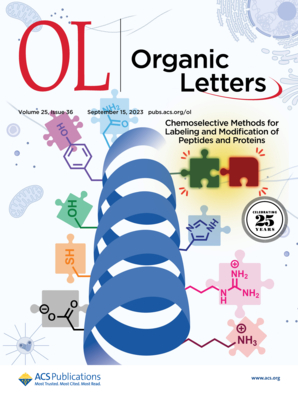利用宝石-二硼自由基:ni催化的多种sp3-富分子结构的还原偶联平台。
IF 5
1区 化学
Q1 CHEMISTRY, ORGANIC
引用次数: 0
摘要
在此,我们报道了一种实用的镍催化α-氯-宝石-二硼化合物与碳亲电试剂的还原交叉偶联,为广泛的宝石-二硼结构提供了有效的途径,包括以前未开发的α-芳基化衍生物。这种转化是通过不发达的宝石-二硼自由基中间途径进行的,具有条件温和、操作简单、优异的区域选择性和广泛的官能团耐受性。值得注意的是,这种方法克服了使用简单的烷基卤化物亲电试剂形成Csp3-Csp3键的长期挑战,从而扩大了传统上难以捉摸的分子支架的获取途径。本文章由计算机程序翻译,如有差异,请以英文原文为准。
Harnessing gem-Diboron Radicals: A Ni-Catalyzed Reductive Coupling Platform for Diverse sp3-Rich Molecular Architectures.
Herein, we report a practical nickel-catalyzed reductive cross-coupling of α-chloro-gem-diboron compounds with carbon electrophiles, providing efficient access to a broad range of gem-diboron structures, including previously underdeveloped α-arylated derivatives. This transformation proceeds via an underdeveloped gem-diboron radical intermediate pathway and features mild conditions, operational simplicity, excellent regioselectivity, and broad functional group tolerance. Notably, this method overcomes the long-standing challenge of Csp3-Csp3 bond formation using simple alkyl halide electrophiles, thereby expanding access to traditionally elusive molecular scaffolds.
求助全文
通过发布文献求助,成功后即可免费获取论文全文。
去求助
来源期刊

Organic Letters
化学-有机化学
CiteScore
9.30
自引率
11.50%
发文量
1607
审稿时长
1.5 months
期刊介绍:
Organic Letters invites original reports of fundamental research in all branches of the theory and practice of organic, physical organic, organometallic,medicinal, and bioorganic chemistry. Organic Letters provides rapid disclosure of the key elements of significant studies that are of interest to a large portion of the organic community. In selecting manuscripts for publication, the Editors place emphasis on the originality, quality and wide interest of the work. Authors should provide enough background information to place the new disclosure in context and to justify the rapid publication format. Back-to-back Letters will be considered. Full details should be reserved for an Article, which should appear in due course.
 求助内容:
求助内容: 应助结果提醒方式:
应助结果提醒方式:


